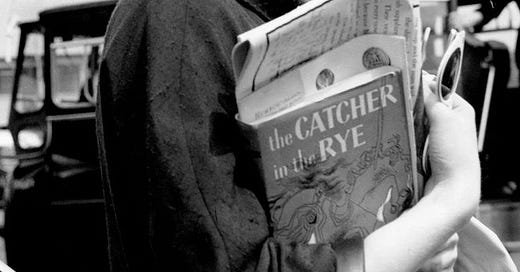Months ago in my program at NYU, a student presented a survey for the class on book opinions. One of the questions prompted was, “What is the most overrated book of all-time, in your opinion?” In a class of maybe eight people, someone (I think the instructor, actually,) gave an answer several students nodded at: Catcher in the Rye.
Of course, this group didn’t know that in their midst was a real JD Salinger fangirl – because, seriously, why would they have ever thought that. Nobody reads Salinger anymore. Least of all past ninth grade, where they determine Catcher to be, literally, the most overrated book of all time. Actually, kind of an accomplishment.
First of all, I’ll try not to make too much of a face at that statement, given the Colleen Hoovers and James Pattersons of the world (no offense, I mean it) that an author people know little about who’s book they kind of read at fifteen years old was the worst book ever. Instead, I’ll propose something I know is outrageous – it doesn’t have to be your favorite book, but consider a book you were made to read in your adolescence wasn’t unbearable to you because it’s worthless. Perhaps...you were a teenager who didn’t want to read that book. Perhaps, it was difficult to read through your eyeroll. Perhaps...that very feeling during adolescence was kind of the whole point.
If you were to talk to that very same group of women and ask them about men – the men they walk by in the city, the men they’ve dated, the men they know and love – if you talked to them seriously about those men, about the relationships they see those men having in their life, their habits, the media they consume, their worldview – you’d find a lot of concern, angst, worry, or irritation from those women, myself included. You’d find what you already know, which is that men and women are at a tension point, politically and socially. You’d find that men feel like nobody cares and a lot of women do care but are also frustrated at those men for feeling hostile towards them and you’d find this kind of cycle of resentment and pain and struggle for connection. And here is the thing about Catcher in the Rye and also about Salinger: that was art by a man who felt betrayed and disillusioned with the world, as a result of a tumultuous climate around him. He went to war and came back and was never the same, which anyone who knew him would testify to – he was changed forever from the violence, he was permanently imbued with pessimism, he struggled to relate and would not open up and had poor relationships with the people closest to him, most especially women, with whom he was extremely charming and wickedly handsome but terribly broken. Does that sound familiar? Does it sound irrelevant? Does it sound overrated?
I loved Catcher in the Rye, because at seventeen I also felt caught between childlike wonder and fear, that the world around me was superficial, and the possibilities of my future could go either way. At twenty I read Franny and Zooey after having seen it on my mother’s bookshelf all my life and again felt moved by the portrait of equal parts irritation and love for the world I’d seen no one paint like Salinger, of the crisis of spirituality and religion and purpose he played with so masterfully in not only his art but also his personal life. Half Jewish, half Catholic, Salinger fought in the war against Germany alongside American soldiers who were as hateful towards him as the enemy on the other side, and he struggled his whole life with his faith, at times moving himself and his family towards cult-like spaces if he were convinced there were an answer there. He was difficult to be around and deeply reserved, with evidence from the people closest to him that he was cruel and manipulative. I’m not saying you have to love him. I’m not defending the tortured artist thing. I’m just saying that’s how it was and it was real and it doesn’t seem out of touch to suggest that the themes and feelings of his work are still relevant. Further, I’d actually suggest that one of the keys in treating something like the “male loneliness epidemic,” might actually include looking at real depictions of male loneliness with sensitivity and appreciation, rather than blatant disregard.
For what it’s worth, I’d also reject the claim that it’s, as they said in class, “a man book.” I feel as close to my favorite Salinger works as I do to my favorite works by women. And I’m not saying that to be some sort of pick-me or apologist – I just really feel that way, and I wouldn’t say so if I didn’t. There’s a part in Franny and Zooey where Zooey’s mother says to him: “You don’t know how to talk to anybody you don’t like. Don’t love, really. You can’t live in a world with such strong likes and dislikes.” In the last line of Catcher Salinger writes: “Don’t ever tell anybody anything. If you do, you start missing everybody.” There was a specific kind of reservation with affection that he could get at that I haven’t seen anybody else get at. I’m not saying you have to like it, I’m saying that’s how it was; and to me, that quality is rare, underrated.




Thank you so much for this. I got worried when I saw the title and the accompanying picture lol. The Catcher in the Rye is my favourite book to this day because of the exact things you describe. Wonderfully written ~
My friend Pheobe (named from JD Salinger’s CATR character) is going to absolutely love this piece!
*as did I!